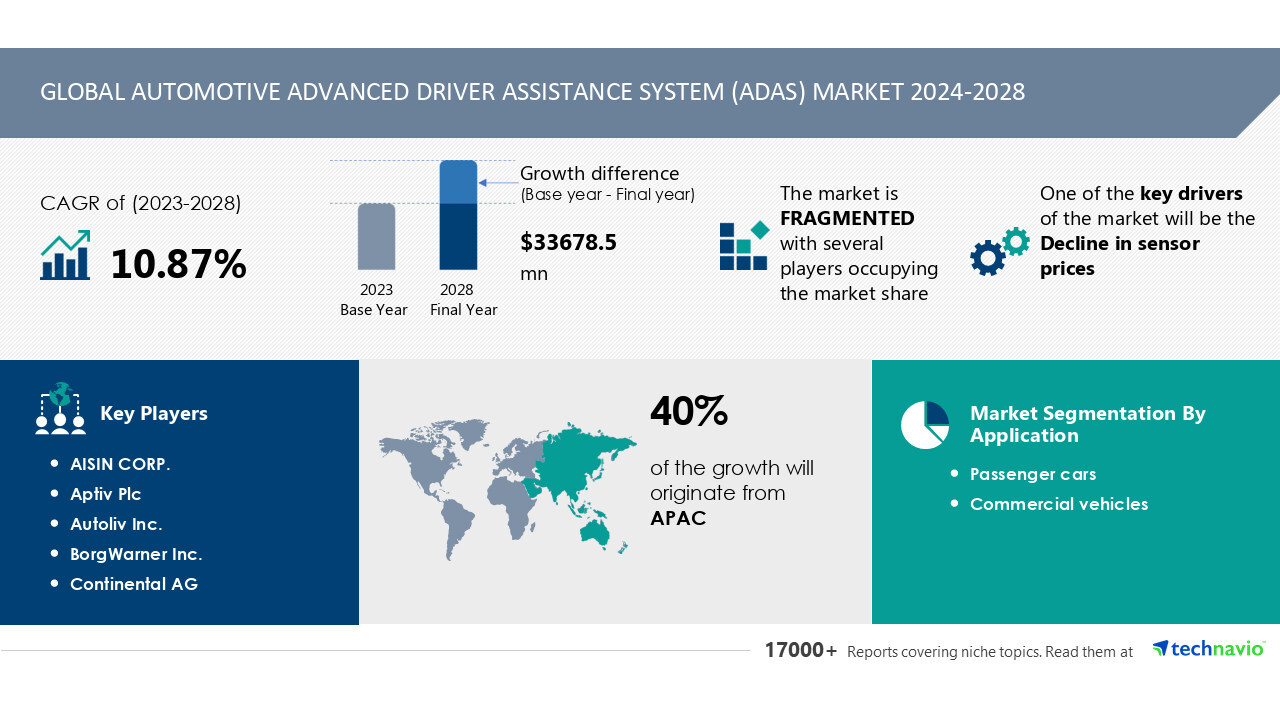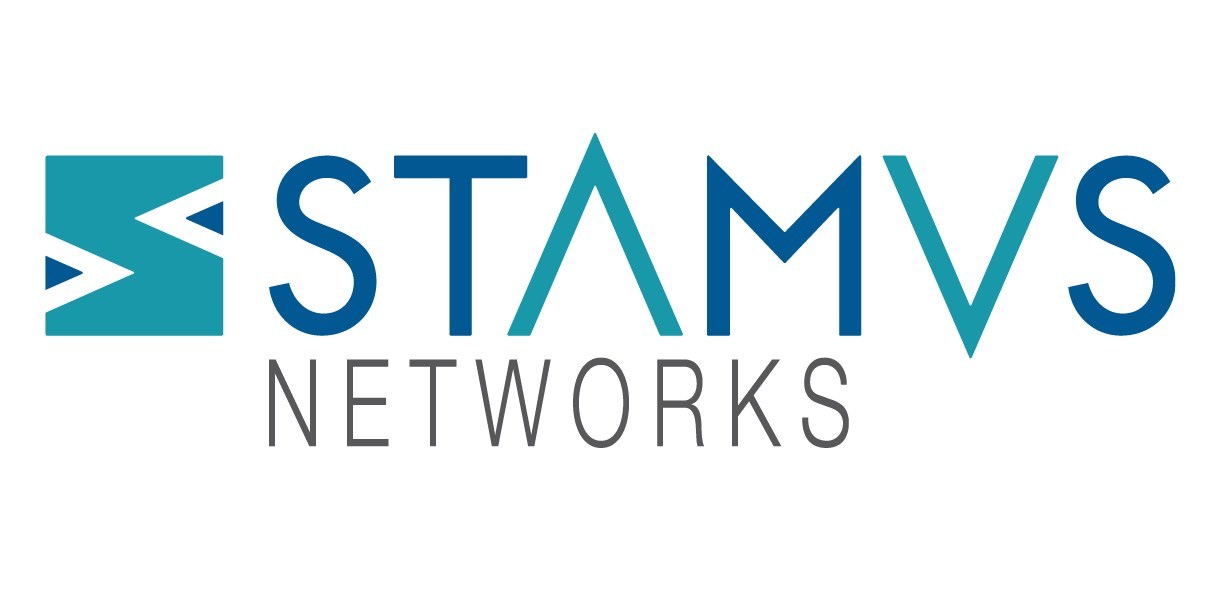NEW YORK, July 24, 2024 -- The global automotive advanced driver assistance system (ADAS) market size is estimated to grow by USD 33.67 billion from 2024-2028, according to Technavio. The market is estimated to grow at a CAGR of 10.87% during the forecast period. Decline in sensor prices is driving market growth, with a trend towards growing development of ai-enabled ADAS solutions. However, high costs associated with service and maintenance of adas poses a challenge. Key market players include AISIN CORP., Aptiv Plc, Autoliv Inc., BorgWarner Inc., Continental AG, DENSO Corp., Gentex Corp., Harman International Industries Inc., HELLA GmbH and Co. KGaA, Hyundai Motor Co., Infineon Technologies AG, Intel Corp., Magna International Inc., NXP Semiconductors NV, Panasonic Holdings Corp., Renesas Electronics Corp., Robert Bosch GmbH, Valeo SA, Veoneer Inc., and ZF Friedrichshafen AG.
Get a detailed analysis on regions, market segments, customer landscape, and companies- View the snapshot of this report
Automotive Advanced Driver Assistance System (ADAS) Market Scope | |
Report Coverage | Details |
Base year | 2023 |
Historic period | 2018 - 2022 |
Forecast period | 2024-2028 |
Growth momentum & CAGR | Accelerate at a CAGR of 10.87% |
Market growth 2024-2028 | USD 33678.5 million |
Market structure | Fragmented |
YoY growth 2022-2023 (%) | 9.53 |
Regional analysis | Europe, North America, APAC, South America, and Middle East and Africa |
Performing market contribution | APAC at 40% |
Key countries | US, Germany, China, Japan, and France |
Key companies profiled | AISIN CORP., Aptiv Plc, Autoliv Inc., BorgWarner Inc., Continental AG, DENSO Corp., Gentex Corp., Harman International Industries Inc., HELLA GmbH and Co. KGaA, Hyundai Motor Co., Infineon Technologies AG, Intel Corp., Magna International Inc., NXP Semiconductors NV, Panasonic Holdings Corp., Renesas Electronics Corp., Robert Bosch GmbH, Valeo SA, Veoneer Inc., and ZF Friedrichshafen AG |
Market Driver
Automotive companies are prioritizing customer needs and personalized solutions in a connected environment. Artificial Intelligence (AI) technology is increasingly used in Advanced Driver Assistance Systems (ADAS) due to its ability to mimic human brain functions. AI-based ADAS continuously learns and enhances object detection and recognition. NVIDIA DRIVE AutoPilot, for instance, has AI capabilities that significantly improve object detection. Major ADAS manufacturers like ZF Friedrichshafen and Continental have started producing AI-based ADAS solutions based on NVIDIA DRIVE AutoPilot. The demand for effective active safety and reliable driving systems will drive the growth of the global automotive ADAS market. AI-enabled ADAS solutions are expected to gain significant traction due to their power efficiency and reduced development time. This trend will continue to shape the market during the forecast period.
The Automotive Advanced Driver Assistance System (ADAS) market is experiencing significant growth as software companies and service providers team up with ride-sharing operators, luxury vehicle manufacturers, and automakers to integrate advanced safety features. Night vision systems, drowsiness monitoring, and sensor technology are key trends in this sector. With the rise of vehicle electrification and automation, processors, software, and sensors are in high demand. Passenger cars and commercial vehicles are adopting these systems to meet safety standards and regulations, such as Vision Zero, which aims for road safety with zero fatalities and injuries. Lane departure warning, self-driving vehicles, and collision avoidance systems are becoming standard features. Continental, Seeing Machines, Analog Devices, and other industry leaders are developing AI-oriented automotive solutions using infrared cameras and DMS/OMS systems. Road safety is a top priority, with proactive measures including anti-lock braking systems, electronic stability control, and adaptive cruise control.
Discover 360° analysis of this market. For complete information, schedule your consultation - Book Here!
Market Challenges
- The Automotive Advanced Driver Assistance System (ADAS) market growth is being hindered by several factors. One major challenge is the high cost of maintenance and repair for vehicles equipped with ADAS. These systems, which include features like Adaptive Cruise Control (ACC), Blind Spot Detection (BSD), and Automatic Emergency Braking System (AEBS), use sophisticated technology like radar sensors. The repair costs for these sensors are significantly high, with radar sensors for AEBS and ACC costing above USD900, and rear radar sensors for BSD and rear cross-traffic alert costing about USD2,000. This high repair cost is a significant barrier to ADAS adoption, particularly in emerging economies where customers are price-sensitive. Another challenge is the shortage of skilled technicians required to calibrate and repair ADAS technology. This shortage is particularly acute in prominent economies, such as the US, where the automotive industry is projected to need around 46,000 skilled automotive technicians by 2026. The global automotive industry is already facing a shortage of skilled technicians, leading to rising repair and maintenance costs. This shortage is expected to continue, posing a significant challenge to the growth of the automotive ADAS market during the forecast period.
- The Automotive Advanced Driver Assistance System (ADAS) market is experiencing significant growth due to the increasing demand for safety features in electric and autonomous vehicles. Road safety remains a top priority, with a focus on reducing accidents and injuries. Automakers are responding with proactive measures such as anti-lock braking systems, electronic stability control, collision avoidance systems, adaptive cruise control, and crash test ratings. However, challenges remain, including the need for standardized infrastructure in rural and less-developed areas, and the integration of technologies like Automotive Ethernet, high-definition cameras, and sensors (radar, LIDAR, ultrasonic, image, infrared) with human-machine interfaces. Regulations continue to evolve, with a focus on safety standards and infrastructure improvements. General Motors, microcontroller units, electronic control units, and controllers are key players in this market. Premium vehicles often include advanced ADAS systems, such as vehicle radar, sensing systems, control modules, power electronics, and human-machine interfaces for vehicle speed and engine fuel supply. E-Hailing service providers are also investing in ADAS to enhance safety and improve the customer experience.
For more insights on driver and challenges - Request a sample report!
Segment Overview
This automotive advanced driver assistance system (adas) market report extensively covers market segmentation by
- Application
- 1.1 Passenger cars
- 1.2 Commercial vehicles
- Technology
- 2.1 AEBS
- 2.2 TPMS
- 2.3 PAS
- 2.4 LDWS and others
- Geography
- 3.1 Europe
- 3.2 North America
- 3.3 APAC
- 3.4 South America
- 3.5 Middle East and Africa
1.1 Passenger cars- The passenger cars segment is the largest adopter of Advanced Driver Assistance Systems (ADAS) in the automotive industry, driven by automotive Original Equipment Manufacturers (OEMs) seeking to enhance vehicle safety ratings and differentiate their products. Developed regions, including North America and Europe, lead the adoption due to stringent safety regulations, such as the US National Highway Traffic Safety Administration's (NHTSA) 5-Star Safety Ratings program, which emphasizes ADAS technologies like Automatic Emergency Braking Systems (AEBS), Forward Collision Warning Systems (FCWS), Lane Departure Warning Systems (LDWS), Tire Pressure Monitoring Systems (TPMS), and rear-view video systems. Key players, such as Daimler AG (Daimler), BMW AG (BMW), and Volkswagen AG (Volkswagen), are pioneering the adoption of emerging ADAS technologies in mass-market passenger cars, fueling market growth. Luxury car manufacturers also innovate advanced ADAS functionalities to differentiate their offerings, collaborating to develop automated technologies, further driving the passenger cars segment's growth in the global automotive ADAS market.
For more information on market segmentation with geographical analysis including forecast (2024-2028) and historic data (2017-2021) - Download a Sample Report
Learn and explore more about Technavio's in-depth research reports
The global Automotive ADAS Aftermarket is experiencing robust growth, driven by increasing demand for advanced safety features and technological advancements. Concurrently, the global Automotive Advanced Driver Assistance System (ADAS) Sensors Market is also on the rise, with a focus on enhancing vehicle safety and automation. This market is expected to grow significantly, driven by innovations in sensor technology and rising consumer awareness about vehicle safety. Both markets reflect a growing emphasis on advanced automotive technologies.
Research Analysis
The Automotive Advanced Driver Assistance System (ADAS) market is experiencing significant growth due to the increasing demand for road safety and the integration of electric vehicles (EVs) and autonomous vehicles (AVs) into the automotive industry. ADAS technologies, including night vision systems, sensor and processor technologies, and AI-oriented automotive, are designed to enhance safety features in vehicles, reduce accidents, injuries, and road traffic fatalities. These proactive measures are particularly important for luxury vehicles and battery electric vehicles (BEVs), which may have unique safety challenges. The market for ADAS is driven by safety standards and consumer demand for increased vehicle automation and electrification. Companies such as Continental, Seeing Machines, and Analog Devices are leading the way in the development of innovative ADAS technologies, including infrared cameras and AI-based systems, to create self-driving vehicles that prioritize safety and performance.
Market Research Overview
The Automotive Advanced Driver Assistance System (ADAS) market is witnessing significant growth due to the increasing focus on road safety and reducing accidents. Electric vehicles and autonomous vehicles are driving the demand for advanced safety features, including anti-lock braking systems, electronic stability control, collision avoidance systems, adaptive cruise control, and lane departure warning. Automakers are integrating these safety systems into premium and luxury vehicles to meet safety standards and regulations. Road infrastructure plays a crucial role in the effective implementation of ADAS, with standardized infrastructure and cloud data essential for proactive measures. In rural and less-developed areas, high-definition cameras, Automotive Ethernet, and e-hailing service providers are key. Sensors, including radar, LIDAR, ultrasonic, image, and infrasound, are integral to ADAS, along with microcontroller units, electronic control units, and human-machine interfaces. Vehicle speed, engine fuel supply, and vehicle radar sensing systems are controlled by controllers, power electronics, and software companies. Vision Zero, a road safety initiative, is a key focus area for ride-sharing operators and luxury vehicle manufacturers. Night vision systems, drowsiness monitoring systems, vehicle electrification, and vehicle automation are also gaining popularity in the market.
Table of Contents:
1 Executive Summary
2 Market Landscape
3 Market Sizing
4 Historic Market Size
5 Five Forces Analysis
6 Market Segmentation
- Application
- Passenger Cars
- Commercial Vehicles
- Technology
- AEBS
- TPMS
- PAS
- LDWS And Others
- Geography
- Europe
- North America
- APAC
- South America
- Middle East And Africa
7 Customer Landscape
8 Geographic Landscape
9 Drivers, Challenges, and Trends
10 Company Landscape
11 Company Analysis
12 Appendix
About Technavio
Technavio is a leading global technology research and advisory company. Their research and analysis focuses on emerging market trends and provides actionable insights to help businesses identify market opportunities and develop effective strategies to optimize their market positions.
With over 500 specialized analysts, Technavio's report library consists of more than 17,000 reports and counting, covering 800 technologies, spanning across 50 countries. Their client base consists of enterprises of all sizes, including more than 100 Fortune 500 companies. This growing client base relies on Technavio's comprehensive coverage, extensive research, and actionable market insights to identify opportunities in existing and potential markets and assess their competitive positions within changing market scenarios.
Contacts
Technavio Research
Jesse Maida
Media & Marketing Executive
US: +1 844 364 1100
UK: +44 203 893 3200
Email: media@technavio.com
Website: www.technavio.com/
This News is brought to you by Qube Mark, your trusted source for the latest updates and insights in marketing technology. Stay tuned for more groundbreaking innovations in the world of technology.









